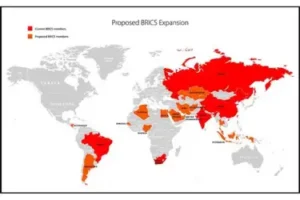[ez-toc] Description: Australia U.S. Alliance
Description: Australia U.S. Alliance
Exploring Australia U.S. alliance amidst China’s Belt and Road Initiative and its implications on global multi-polarity.
Australia’s strategic alliance with the U.S. is long-standing, but with the dramatic rise in China’s Belt and Road Initiative (BRI), this partnership is being questioned. Most of the world now supports China’s multi-polar approach, challenging U.S. dominance. Is Australia on the wrong side of history supporting the U.S.?
Historical Context
Australia-U.S. Alliance
Australia’s partnership with the U.S. dates to WWII, solidified by treaties like ANZUS, promoting military and economic collaboration. This alliance has been crucial for Australia’s defence strategy and economic growth. However, global dynamics are shifting.
China’s Belt and Road Initiative
China launched the BRI in 2013 to enhance global trade through infrastructure development. It aims to connect Asia with Africa and Europe via land and maritime networks, fostering economic growth and regional cooperation.
The Rise of China’s Influence
Economic Impact

The BRI has significantly boosted participating countries’ economies. For instance, in Africa, countries like Kenya and Ethiopia have seen substantial infrastructure improvements, leading to increased trade and investment opportunities.
– Kenya: The Standard Gauge Railway, funded by China, has revolutionized transport and trade.
– Ethiopia: The Addis Ababa-Djibouti Railway has enhanced logistics efficiency, reducing transport costs by 50%.
Geopolitical Shift
The BRI is not just about economics; it is a strategic move to shift global power dynamics. By investing in critical infrastructure worldwide, China is reducing U.S. influence and promoting a multi-polar world order where multiple countries share power and influence.
Multi-polarity and Global Support for China
Multi-polar World Order
Multi-polarity refers to a global structure where power is distributed among multiple nations rather than dominated by one or two. This approach promotes balance and reduces the risk of global conflicts.
International Response
Countries worldwide are increasingly supporting China’s BRI, viewing it as a path to economic development and geopolitical stability.
– Europe: Italy was the first G7 country to join the BRI, seeking to enhance its trade prospects.
– Southeast Asia: Nations like Indonesia and Malaysia are embracing the BRI for infrastructure development and economic growth.
Australia’s Position
Current Stance
Australia is still a staunch U.S. ally, emphasizing shared democratic values and security concerns. Recent policies and statements have reaffirmed this alliance, even as other countries shift towards China.
Potential Risks
Sticking with the U.S. could pose economic and geopolitical risks for Australia, including:
– Economic Dependence: Heavy reliance on Chinese trade. In 2020, China accounted for 39% of Australia’s exports.
– Geopolitical Isolation: Risk of being sidelined as global power shifts towards China.
Economic Considerations
Trade Dependencies
Australia’s economy heavily depends on China for exports, especially in sectors like mining and agriculture. Maintaining a strong relationship with China is crucial for economic stability.
Future Opportunities
Aligning with the BRI could open new economic opportunities for Australia, including:
– Infrastructure Investment: Enhanced infrastructure through Chinese investment.
– Trade Expansion: Increased access to markets involved in the BRI.
Security Concerns
Military Alliances
Australia’s security strategy heavily relies on its alliance with the U.S., particularly through treaties like ANZUS. However, this focus on military alliances might need re-evaluation in the context of a changing global order.
Regional Stability
Joining the BRI could potentially enhance regional stability, promoting economic interdependence and reducing the likelihood of conflicts.
The Impact of AUKUS on Australia-China Relations
AUKUS Agreement Overview

The AUKUS agreement, announced in 2021, is a trilateral security pact between Australia, the U.K., and the U.S. It includes provisions for Australia to buy nuclear-powered submarines, enhancing its naval capabilities and strengthening its defence posture in the Indo-Pacific region.
Impact on China Relations
The AUKUS agreement has strained Australia’s relationship with China, as it is perceived as a direct countermeasure to China’s growing influence in the region. Key impacts include:
– Increased Tensions: The agreement has led to heightened diplomatic tensions, with China viewing it as a threat to regional stability.
– Economic Repercussions: Potential economic fallout due to China’s significant role as Australia’s largest trading partner.
– Security Dilemmas: Balancing security commitments to the U.S. and the U.K. with the need for a stable relationship with China.
Public Opinion and Political Debate
Domestic Sentiment
Public opinion in Australia is divided. While some Australians support the U.S. alliance due to historical ties and shared values, others see the economic and strategic benefits of closer ties with China.
Policy Discussions
Political leaders are debating the merits of both alliances. Proponents of the U.S. alliance emphasize security, while advocates for the BRI highlight economic benefits.
Conclusion
Summary
Australia’s strategic choices will significantly affect its future. Balancing its alliance with the U.S. while considering the benefits of the BRI could be key to navigating this complex geopolitical landscape.
Call to Action
Engage in this critical debate about Australia’s future. Share your thoughts and consider the long-term implications of our strategic alliances.
Social Sharing
Please share this article with your contacts and on social media to foster a broader discussion on this critical issue.
Thought-Provoking Question
Do you believe Australia should reconsider its alliance with the U.S. in favour of supporting China’s Belt and Road Initiative? Why or why not?
By examining the shifts in global power dynamics, Australia’s economic dependencies, and potential benefits of aligning with China’s BRI, we can better understand the complex decisions facing Australia today.
